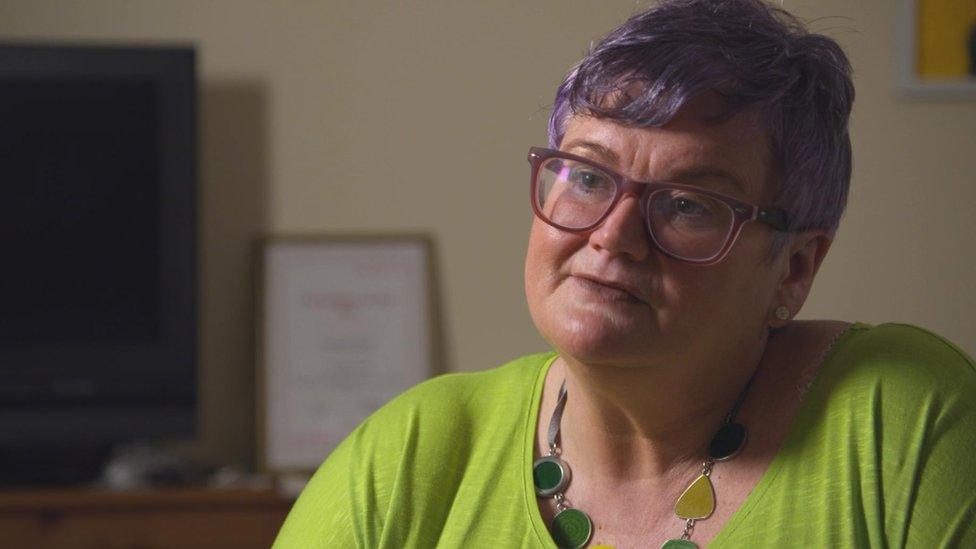The week ahead in Parliament
- Published
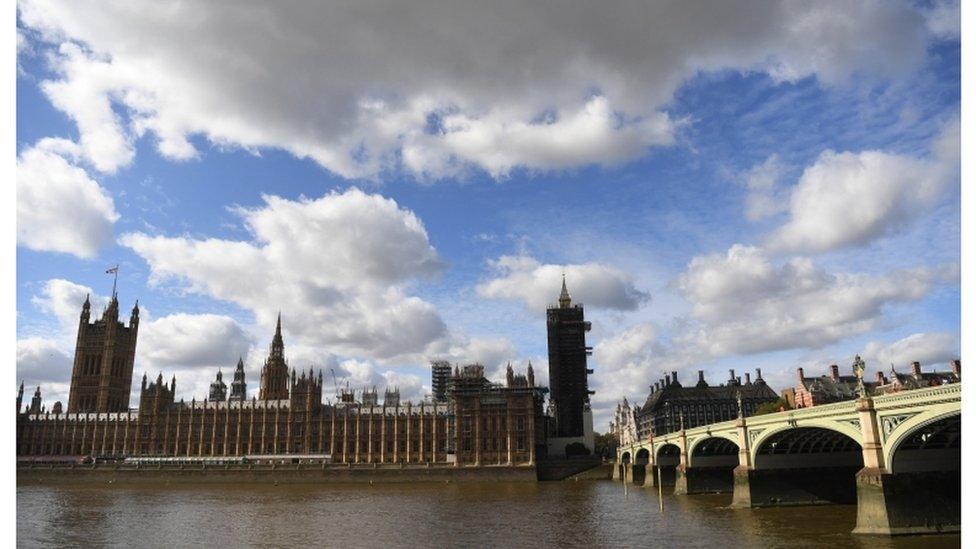
There's no sense of coasting in the final week before Parliament takes its Easter break, with big-ticket government policy announcements due on defence, immigration and an industrial crisis over steel.
There's likely to be an urgent question or statement on the future of Liberty Steel, which runs 12 steel plants in the UK, including at Rotherham, Motherwell and Newport, and employs 5,000 people; plus a final day devoted to both Houses debating the renewal of the emergency pandemic legislation, the Coronavirus Act.
Meanwhile the list of candidates to follow Lord Fowler as Lord Speaker will be announced on Tuesday, with a virtual hustings meeting (chaired by me) on Thursday. Ballot papers go out on 29 March, and the result should be announced on 21 April. My understanding is that there will be three candidates in the ring - Labour's Lady Hayter and Lord McFall, and the Liberal Democrat Lord Alderdice.
One footnote to this week's action; given the sudden political toxicity around the right to protest, I wonder whether much will be seen of the Police, Crime, Courts and Sentencing Bill before the local elections and the expected state opening of Parliament in May?
Normally such a vast bill would move pretty smartly into committee stage scrutiny, but maybe the government would like a bit of breathing space to figure out how to respond to furore generated by the policing of the Clapham Common protests.
The end date for the committee stage is 22 June, which means that there's no great time pressure to hold potentially painful witness sessions with arrested protesters and aggrieved civil liberties groups before the May elections - which ministers might think was just as well. But, see below, the Home Affairs Committee will be summoning witnesses on those protests.
Here's my rundown of the week ahead:
Monday 22 March
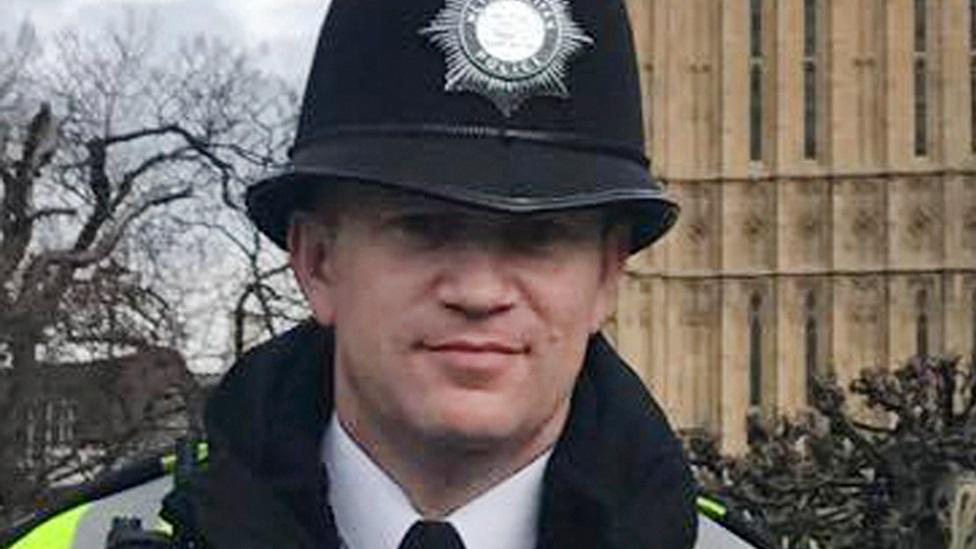
PC Keith Palmer was killed in the 2017 Westminster Bridge attack.
It's the fourth anniversary of the terrorist murder of PC Keith Palmer - and the flags over Parliament will fly at half-mast.
The Commons opens (14:30) with Home Office questions,
The main business is consideration of Lords amendments to the Trade Bill, the Fire Safety Bill, and the Counter-Terrorism and Sentencing Bill. These sessions will cover the latest incarnation of the Alton amendment on trade with states complicit in genocide, sent back to the Commons for the third time by peers, and the post-Grenfell Lords amendment to shield owners of leasehold flats from paying the cost of fire prevention measures mandated by the Fire Safety Bill. Might there now be some offer of compromise from ministers on one, or both, of these?
After which the largely uncontroversial Air Traffic Management and Unmanned Aircraft Bill will whiz through its remaining stages of consideration.
In Westminster Hall there's a debate on e-petition 570779, on consent for a referendum on Scottish independence: "The SNP government appears solely intent on getting independence at any cost. The independence referendum was called a once in a generation vote - so let it be."
That's followed by a combined debate on five e-petitions around the government's Spring 2021 Covid roadmap - the first, which attracted 120,000 signatures, calls for the repeal the Coronavirus Act, complaining that it grants potentially dangerous powers including to detain some persons indefinitely. The second, with 132,000 signatures, calls for the government to allow golf to be played with appropriate safety measures; the third (179,000 signatures) says ministers should keep gyms open during Tier 4 lockdown and the fourth (103,000 signatures) urges the closing of all nurseries and early years settings in light of the new lockdown, to protect early years staff. Finally there's a petition calling for the government to "open gyms first as we come out of lockdown and fund a Work Out to Help Out scheme."

Lockdown measures are being debated again.
The day's committee action includes Public Accounts (14:30) quizzing BBC director general Tim Davie and other top brass on the corporation's strategic financial management.
The Digital, Culture, Media and Sport committee (16:00) concludes its long-running inquiry into the economic issues underlying music streaming with evidence from DCMS Minister Caroline Dinenage and the business minister Amanda Solloway. They're looking at the distribution of streaming revenues and whether artists get a fair share.
And Theresa May becomes the second ex-prime minister to give evidence on national security machinery to the super-committee on the National Security Strategy (16:00). The committee will also take evidence from her chancellor, Philip Hammond (from 17:00). The session will also allow the committee to discuss proposals in the government's recently published Integrated Review, for example for a White House-style "situation room" in Downing Street.
In the Lords (13:00), the day opens with the introduction to the House of Lord Coaker, the former Labour shadow defence secretary, Vernon Coaker, who lost his Nottinghamshire seat in 2019. Question time ranges across increasing the number of homes using heat pumps, British judges continuing to sit in courts in Hong Kong, helping people with the costs of running for office, and the impact of the pandemic on prisoners.
The main business is consideration of a series of orders and regulations.
Tuesday 23 March
MPs open the day (11:30) with Business, Energy and Industrial Strategy questions,
The day's Ten Minute Rule Bill, from the Conservative Dean Russell, is on first aid for mental health.
The main legislative action is the second reading debate of the Advanced Research and Innovation Agency (ARIA) Bill, the measure to create a new wild card research body modelled on the US's Darpa - free of the normal restrictions applied to other research bodies. It's the brainchild of the former prime ministerial aide, Dominic Cummings.
In Westminster Hall (09:25) there's a cross-party debate on government-backed insurance for live events, with MPs arguing that an insurance scheme would unlock the events and entertainment industry - giving the organisers of music festivals and other events the confidence to go ahead with plans to return to normal service. The backers - Conservative Steve Brine, Labour MP Kevin Brennan and Liberal Democrat Jamie Stone - note that the government already underwrites insurance against terrorist attacks on live events, and suggest this new measure would not, ultimately, be a drain on the public purse.
I'm also intrigued by Theresa Villiers' debate (16:15) marking the 550th anniversary of the 1471 Battle of Barnet - a decisive battle in the Wars of the Roses, which saw the death of Warwick the Kingmaker. Mischievous souls might wonder if there's some convoluted political parable struggling to get out of this....
It's a very busy day on the committee corridor, where Digital, Culture, Media and Sport (10.00) continues its investigation into concussion in sport by quizzing ex-football and rugby players and TeamGB athletes on their experiences of head injury. The committee will also question the Rugby Football Union chief executive and the chief medical officers at the FA, World Rugby and TeamGB.
The Health and Social Care committee (09:30) kicks off a new inquiry into children and young people's mental health with evidence from the new children's commissioner, Dame Rachel de Souza.
The Foreign Affairs committee (14:30) looks at the Foreign Office's role in blocking foreign asset stripping in the UK, with ministers Paul Scully and James Cleverly, plus Sarah Mackintosh, deputy director for national security and investment at the business department, and Chris Rampling, director of national security at the Foreign Office.
And, in the wake of the Integrated Review and the Defence White Paper, the Defence committee (15.15) looks at the implications for the UK's armed forces with evidence from two former chiefs of the defence staff, Lord Richards of Herstmonceux and Lord Houghton of Richmond.
In the Lords (12:00), there are questions to ministers on adding folic acid to flour, ensuring children are tried for offences in the youth justice system, and on removing anonymity from persons who post racist and grossly offensive material attacking public figures.
The main event is the continuing ping-pong on the Trade Bill genocide amendment, which is going back and forth between the Houses. I'm told no vote is expected, which may suggest compromise is in the air. This is followed by two approval motions for regulations on the Registration of Marriages; and on the codes of practice on the 2003 Extradition Act.
Wednesday 24 March
Commons business begins (11:30) with half an hour of Women and Equalities questions, followed, at noon, by Prime Minister's Questions.
The day's Ten Minute Rule Bill from the SNP's Douglas Chapman, would ban games console "scalping" where big sellers use bots to buy up eagerly-awaited new gaming kit, so that they can resell them at inflated prices.
The main debates will - unusually for a Wednesday - be on subjects chosen by the Backbench Business committee. The first will be on anonymity and abuse online, and the next on the hospitality industry during the pandemic.
In Westminster Hall (09:25) there's a debate on NHS pay.
The big event on the committee corridor is the prime minister's appearance (15:30) before the Liaison committee, the super-committee made up of select committee chairs. The questioning is expected to focus on the UK's place in the world, the government's response to Covid, and the economy. And there will be what is enigmatically described as a "closing question" from the Procedure committee chair, Karen Bradley.
Before that, Home Affairs (10:00) takes evidence on the policing and organisation of vigils to commemorate the killing of Sarah Everard.
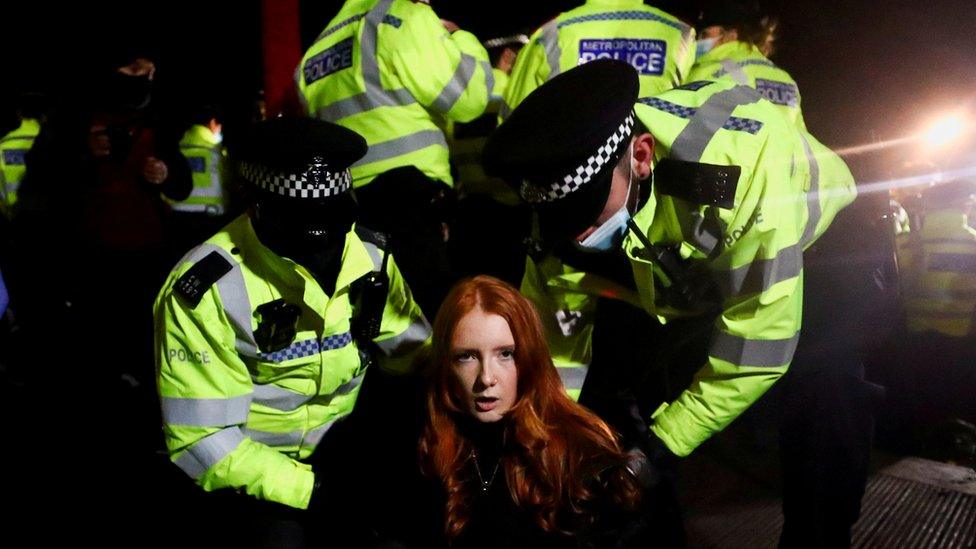
MPs are questioning how police acted during a vigil held for Sarah Everard, who was kidnapped while walking home.
In the Lords (12:00), ministers field questions on reducing food waste, how universities and the police protect the safety of Jewish students, and assistance to British-Iranian national Nazanin Zaghari-Ratcliffe in preparation for the end of her sentence in March.
Peers will then give a brief third reading rubber-stamp to the Domestic Abuse Bill,, external before it goes back to the Commons for MPs to consider the considerable number of amendments the Lords have made, including nine amendments on which the government was defeated.
This is followed by the first day of report consideration of the Financial Services Bill, where there will be amendments pushing for the FCA to introduce a duty of care for consumers and for parliamentary scrutiny of new prudential rules.
Thursday 25 March
The Commons opens (09:30) with 40 minutes of Cabinet Office questions, followed by the weekly statement on forthcoming Commons business from the leader of the House, Jacob Rees Mogg.
The main event will be a debate on the six-monthly renewal of the sweeping emergency powers granted by the Coronavirus Act. This is a simple un-amendable "yes or no" vote on renewal for six months, and the normal practice on this kind of "proceeding under an Act" would be for a 90-minute mini-debate.
Given the significance, though, the government may well decide to allow a longer debate - and can certainly expect some serious criticism if it doesn't, not least when the Lords will be debating the issue for five hours.
Look out for the Coronavirus Recovery Group of Tory backbenchers, who're pushing for a faster lifting of restrictions. One made the point to me that they could countenance a one-month extension, but found six months hard to swallow - although the government argues that the six month extension is needed because the furlough scheme had been extended for six months.
On the committee corridor, Environment, Food and Rural Affairs (14:30) will conclude its inquiry into disruption of seafood and meat exports to the EU by questioning the secretary of state George Eustice. They will cover the problems exporters faced following the end of the transition period, and actions the government might take to help.
In the Lords (12:00), proceedings open with the introduction of another new Labour peer: Baroness Blake of Leeds, who is the former leader of Leeds City Council, Judith Blake. There are then questions on human rights abuses in Bahrain, famine in Yemen and enabling children with learning disabilities to access their child trust funds.
The main business is a parallel debate to that in the Commons on the Coronavirus Act.
Neither House sits on Friday. Parliament begins its Easter recess - with peers returning on 12 April and MPs the next day.
- Published19 March 2021
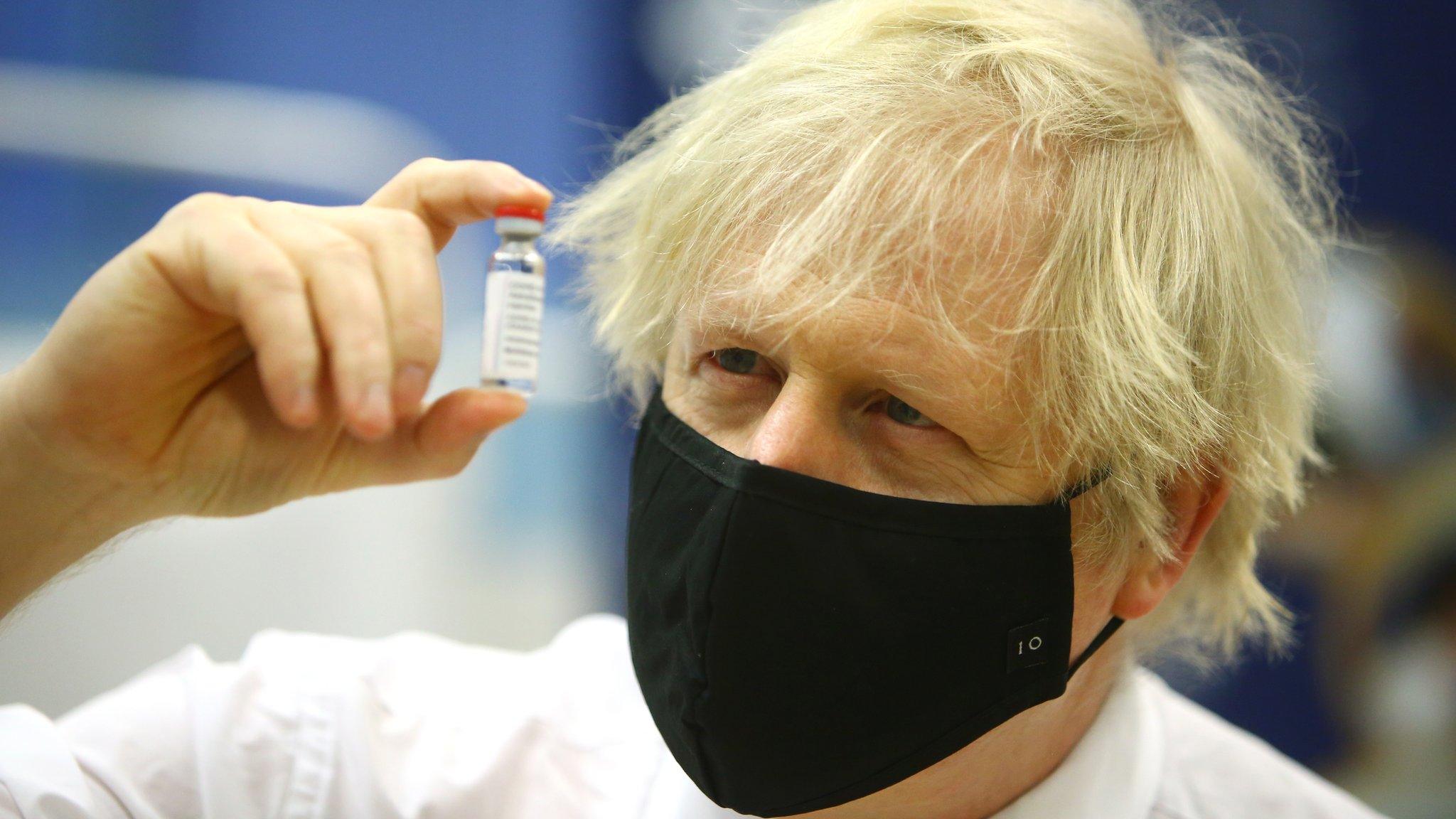
- Published19 March 2021
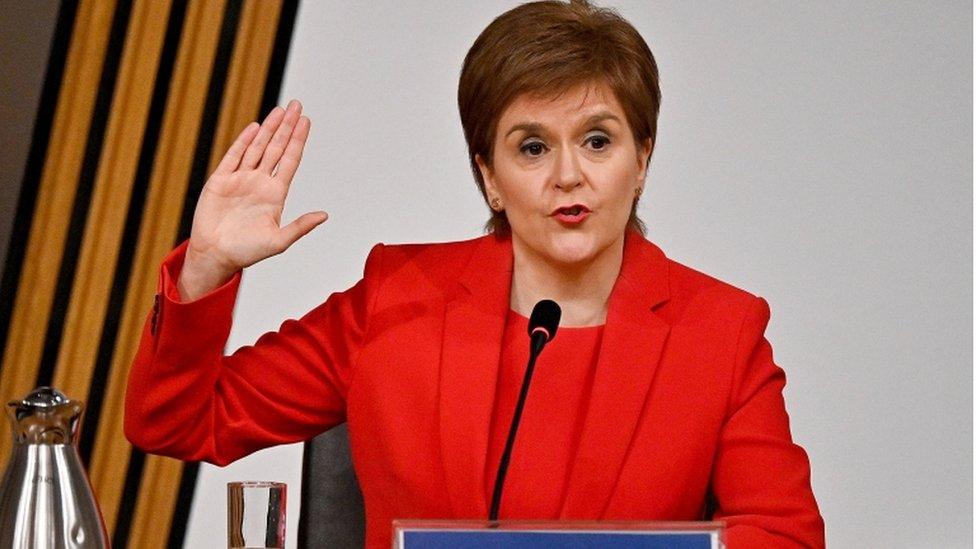
- Published18 March 2021
